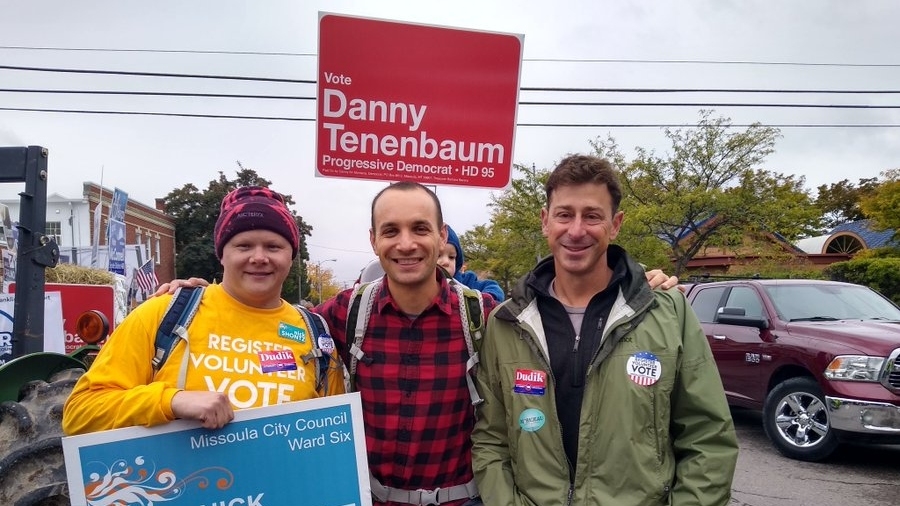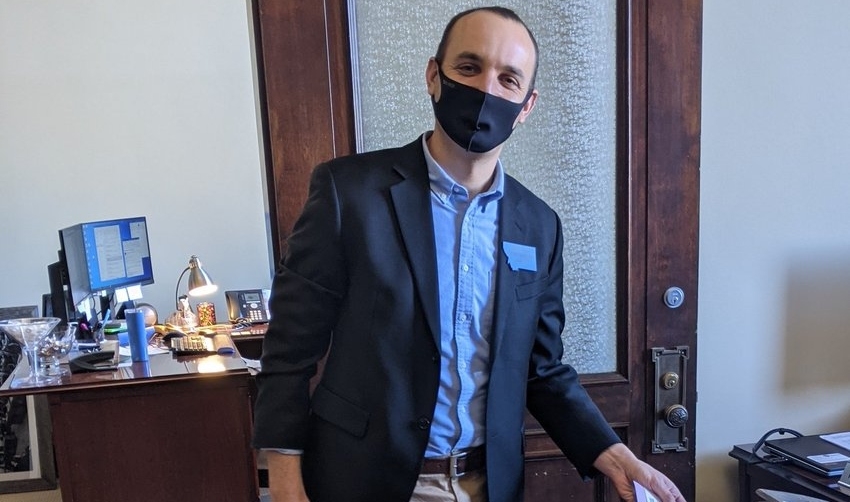(JTA) — As Danny Tenenbaum prepared to open proceedings in the Montana legislature on March 29, he thought to himself: better keep it short. So he sang the Shema prayer.
He had other ideas going into the invocation, he told the Jewish Telegraphic Agency, but he “stuck with what I know best.” The Shema is the Jewish prayer invoking the oneness of God.
“I wanted to do the Hatzi Kaddish, but my Aramaic needs work,” he said, referring to the prayer exalting God’s name which is used as a transition between parts of a service.
It was a bold move by Tenenbaum, 35, a Jew and a Democratic Socialist in a state where both identifications are few and far between. Tenenbaum, elected in 2020 to a two-year term in the lower house, says his tiny minority status motivates him to educate and work with people across faiths and political divides.
“My philosophy is to not hide who I am, and, and to be proud of who I am,” he said. “And frequently that means being the first Jewish person that someone has met here. And to me, it’s kind of exciting to have that opportunity to sort of be the ambassador of my religion or ethnicity, whatever you want to call it.”
Tenenbaum volunteered to give the invocation, he said, because he saw how important it was to fellow legislators who deliver Christian — and sometimes Native American — prayers.
Never miss a story. Sign up for JTA's Daily Briefing.
SUBSCRIBE HERE“I’m not the most outwardly religious person, but I figured it would be fun to volunteer and sing an important prayer,” he said.
Montana’s legislature is about two-thirds Republican and one-third Democrat, which Tenenbaum called “frustrating.”
“In order to get things done, you have to talk with Republicans,” he said.
Surprisingly, he finds his affiliation with the Democratic Socialists of America, or DSA, to be a plus in those talks.
“It sort of made it easier for me to work with Republicans, because to them they saw it as me not just being someone who is a ‘team player for the Democratic Party,’ but someone who thinks independently on every issue and is not so much of a partisan thinker,” he said.
An area where he has scored successes is housing, which has become his signature issue. Republicans were opposed to subsidies for affordable housing, but he was able to get bipartisan support on other aspects of the issue — like tackling zoning ordinances that keep new housing from coming onto the market.
“Younger people in the legislature, both Democrats and Republicans, saw the issue in the same way,” he said. “We needed to increase supply and we needed to increase construction because it’s a problem that’s now being felt statewide with a housing shortage.”
He has had similar successes in building coalitions to strengthen protections for people suffering from dementia and addressing the foster care system and children who are taken from their parents.

Danny Tenenbaum, center, campaigning in Missoula for the Montana House of Representatives, Oct. 6, 2019. (Twitter)
When it came to debating abortion access, Tenenbaum found himself explaining Judaism’s approach to the issue, which vales the mother’s life above all and which is far less stringent than conservative Christian denominations.
“People were citing Christian scripture, and it inevitably led to people asking me what’s the Jewish view on abortion, which is not what I think people expect,” he said. “It’s complex, but a lot of evangelical Christians like to see themselves as, or see their religion as, an extension of Judaism, and they use terms like Judeo-Christian, and so they just sort of assumed that the Jewish faith views abortion in the same way that the Christian faith does. And that’s just not the case.”
A fellow Jewish Democrat in the legislature, Rabbi Ed Stafman, similarly found himself explaining Jewish abortion theology to fellow Republicans.
“The outcome was not good,” Tenenbaum said: Democrats lost the debate and the legislature passed laws restricting abortion access. “But as much as I disagree with them on that specific issue, the conversation and the discussion that I had with folks who are supporting those bills, in the legislature but also in the hallways, was an eye-opening experience for me.”
After Republicans introduced a bill this session that would divest from entities that boycott Israel — legislation popular with many pro-Israel groups — Tenenbaum also found himself explaining to fellow Republicans why he backs the boycott, divestment and sanctions movement. He recalled his education in Hebrew school in suburban Maryland and said he finds BDS “peaceful.”
“We were told over and over again that we need a peaceful partner and we needed Palestinians who were fighting for their cause in a peaceful way,” he said. “And to me, that’s exactly what BDS is, and it’s exactly what we were calling for.”
He said conversations with Palestinians while he toured the Middle East and then in law school “definitely opened up my eyes to their experience, their history and the way that they approach this issue, which for them, it’s an existential issue. It’s literally about their existence.”
Tenenbaum was shocked to learn that the DSA — which endorses the BDS movement — considered expelling member Rep. Jamaal Bowman, D-N.Y., for touring Israel and the West Bank with J Street, a liberal Middle East policy group that defines itself as pro-Israel.
“I wouldn’t support that at all,” Tenenbaum said of the proposed expulsion, in part because of his own experiences touring the region. Tenenbaum was excited when J Street was established in 2008 and became a member.
Tenenbaum grew up in the Maryland suburbs of Washington, D.C., and went to the University of Wisconsin. He spent time traveling throughout the Middle East as a refugee officer for the Department of Homeland Security, and attended law school at New York University.
As he approached graduation and contemplated a family with his wife Bracha, they decided they didn’t want to stay in New York. Tenenbaum cast his mind back to his college days and a summertime cross-country bike trip.
“I stopped in Missoula, and it was a beautiful summer day. I think it was July 4. And it was amazing. It was marvelous and I kept that in the back of my mind,” he said.
He also knew he wanted to be a public defender — in a place “where you didn’t have to wear a tie,” in his words.
“Missoula was that place,” he said.
Nowadays he’s a stay-at-home dad to two small kids, happily gone native. In October he posted a photo of himself and his three-year-old son in matching plaid shirts attending a University of Montana football game.
He is also not shy about being Jewish in a state where the community totals perhaps 1,500. In a tweet in September, Tenenbaum graded the various Rosh Hashanah greetings by the state’s federal lawmakers published in a Chabad calendar.
Democratic Sen. Jon Tester scored highest: “Awareness of actual Holiday. Hebrew!” (Tester included “L’Shana Tova!” in his greeting.) Republican Sen. Steve Daines lost points for “too many fonts,” and Matt Rosendale, the Republican who serves as Montana’s only lawmaker in the U.S. House of Representatives, scored worst.
“Names self but not spouse,” Tenenbaum wrote, followed by a vomit emoji.
In August, after a lawmaker said that Jews were victims of “critical race theory” during the Holocaust, Tenenbaum offered Republicans “free ‘sensitivity training’ on Judaism, the Holocaust, and other topics.”
He steeps himself in the state’s Jewish history and his role in its continuum; in January, not long after he was elected, he went to the Jewish cemetery in Helena, the state capital, to “hang out with my people,” as he said on Twitter. He posted photos of the graves of prominent Jewish Montanans.
Tenenbaum now celebrates life events and Shabbat evenings with a small coterie of Jewish friends in Missoula. He said it feels more natural than the Hebrew school he used to attend.
“We have like five families that we’re very close with. And that’s sort of our congregation,” he said. “I know that’s perceived as being sort of a step down and observance from a formal synagogue. I feel more Jewish now and I feel more religious and more observant now than I did growing up.”
JTA has documented Jewish history in real-time for over a century. Keep our journalism strong by joining us in supporting independent, award-winning reporting.






